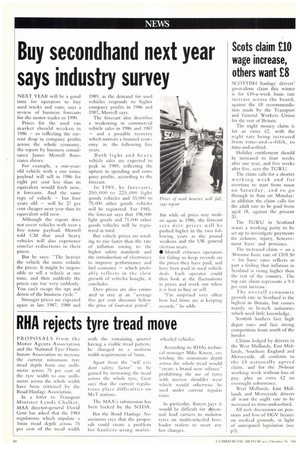Buy secondhand next year says industry survey
Page 12

If you've noticed an error in this article please click here to report it so we can fix it.
NEXT YEAR will be a good time for operators to buy used trucks and vans, says a review of business forecasts for the motor trades to 1990.
Prices for the used van market should weaken in 1986 — so reflecting the current drop in company profits across the whole economy, the report by business consultancy James Morrell Associates shows.
For example, a one-yearold vehicle with a one tonne payload will sell in 1986 for eight per cent less than its equivalent would fetch now, it forecasts. And the same type of vehicle — but. four years old — will be 27 per cent cheaper next year than its equivalent sold now.
Although the report does not cover vehicles with over a five tonne payload, Morrell told CM that used heavy vehicles will also experience similar reductions in their prices.
But he says: "The heavier the vehicle the more volatile the prices. It might be impossible to sell a vehicle at one time, and then suddenly the prices can rise very suddenly. You can't escape the ups and down of the business cycle."
Stronger prices are expected again in late 1987, 1988 and 1989, as the demand for used vehicles responds to higher company profits in 1986 and 1987, Morrell says.
The forecast also describes a weakening in commercial vehicle sales in 1986 and 1987 — and a possible recovery which mirrors a boosted economy in the following five years.
Both light and heavy vehicle sales are expected to peak in 1989, reflecting the upturn in spending and company profits, according to the forecast.
In 1989, he forecasts, 200,000 to 225,000 light goods vehicles and 55,000 to 75,000 other goods vehicles will be registered. For 1985, the forecast says that 198,000 light goods and 71,000 other goods vehicles will be registered in total.
But vehicle prices are tending to rise faster than the rate of inflation owing to the higher safety standards and the introduction of electronics to improve performance and fuel economy — which probably reflects in the slow growth of vehicles bought, it concludes.
Dery prices are also estimated to stay at an "average five per cent discount below the price of four-star petrol". But while oil prices may weaken again in 1986, the forecast says dery prices will he pushed higher in the two following years as the pound weakens and the UK general election nears.
• Morrell criticises operators for failing to keep records on the prices they have paid, and have been paid in used vehicle deals. Each operator could then look at the fluctuations in prices and work out when it is best to buy or sell.
"I'm surprised very often how had firms are at keeping records," he adds.








































































































